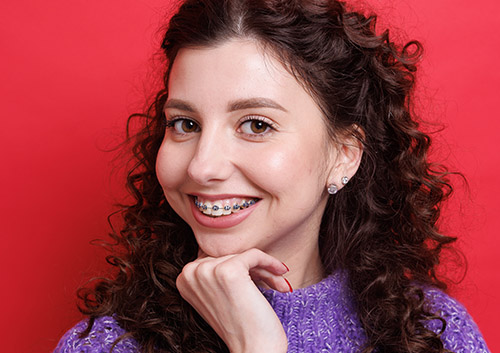New Braces? Time to Level Up Your Brushing Game
September 17th, 2025

You’re an old pro at brushing and flossing by now—after all, you’ve devoted years to looking after your dental health, carefully brushing for two minutes twice each day and flossing daily.
But now, you’ve entered unfamiliar territory—orthodontic treatment. It’s time to level up your brushing game to protect your teeth and gums while you create a more attractive, healthier smile.
Why make changes in your dental routine? Because of plaque. Brackets and wires can make brushing more difficult, allowing plaque to build up around your braces. And plaque which sticks around leads to:
- Demineralization—The bacteria in plaque produce acids, which strip away minerals from tooth enamel. This creates a weak spot in the enamel and can leave a noticeable white stain on your tooth when your braces come off—especially around the places your brackets used to be, because that’s often where plaque accumulates.
- Cavities—Over time, as bacteria continue to attack enamel, a weak spot in the tooth’s surface becomes larger and deeper until it forms a cavity.
- Gingivitis—It only takes a few days for plaque to build up enough to irritate gum tissue and cause tender, inflamed, puffy, or bleeding gums.
Some new skills and new tools will help you keep teeth and gums healthy while you’re wearing braces.
Adapt Your Brushing Strategy
Wearing braces means adapting your brushing and flossing habits. You might need to spend a bit more time cleaning your teeth, but the results will be worth it!
- Brush More Often
Brushing after you eat is generally recommended to remove any food particles and plaque sticking around your brackets and wires. This might mean brushing in the morning, after meals and snacks, and before you go to bed. If you’re unable to brush after eating, be sure to rinse and swish with water to help remove food particles.
- Brush and Floss More Carefully
Brush each tooth surface, outside, inside, and the tops of molars. Angle your brush to clean around brackets and under wires. And while flossing might be more challenging, it’s still essential. Dr. Bill Whitley can show you how to floss when wires get in your way.
Upgrade Your Tools
The right tools make any task easier:
- Toothbrushes— Your teeth and gums might be more sensitive now that you have braces. This is a good time to remember that you never need to scrub your teeth, gums, or braces, and that a soft-bristled brush is the only kind of brush to buy.
There are brushes designed especially for braces which have angled bristles to clean around brackets or smaller heads to fit more comfortably in your mouth. Some people find electric toothbrushes are more effective.
- Interproximal brushes and dental picks—Small cone-shaped brushes and soft picks can clean between your teeth and around your brackets and wires when a brush head is too bulky.
- Floss threaders and braces-friendly floss—Floss threaders are flexible hoops which allow you to maneuver floss under the arch wire and between your teeth. Or try pre-cut floss, which comes with one stiff end to thread easily through your braces and between your teeth.
- Water flossers—A water flosser is a gentle and effective way to help wash away food particles.
- Over the counter or prescription rinses—Dr. Bill Whitley can recommend special rinses which can help prevent cavities.
- Cleaning kit—Put together a kit with toothbrush, travel-size toothpaste, floss or picks, and a small mirror for cleanup on the go.
Because there are so many options, experiment with different tools until you find the best, most efficient way to keep your teeth and braces their cleanest.
Learn from the Experts
Finally, optimize your brushing strategies with help from the experts. The dental team at Whitley Family Dental in Dallas can teach you new brushing and flossing techniques and suggest the best tools to get the best results. And keep up with your regular dental appointments and cleanings! Regular exams will catch any signs of demineralization before they can lead to stains or cavities, and your hygienist can work around your braces to remove plaque you might have missed.
Take some time each day to level up your brushing game, and, when those braces come off, you’ll celebrate with a winning smile!


